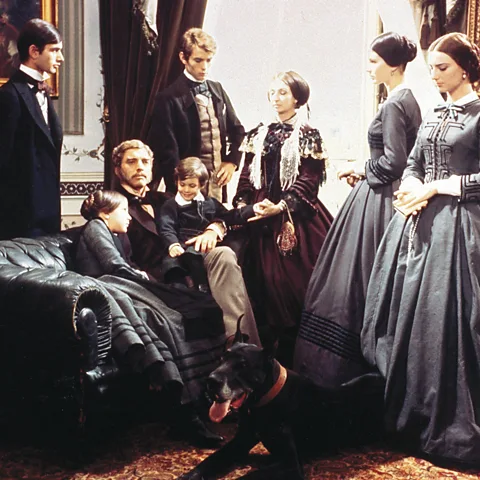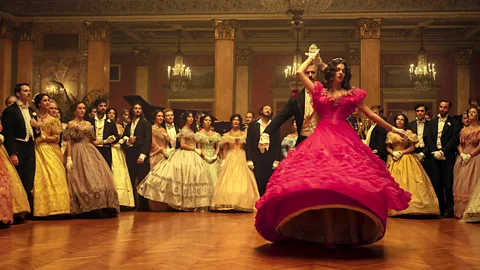 Lucia Iuorio/ Netflix
Lucia Iuorio/ NetflixLampedusa’s mid-20th-Century novel The Leopard became a bestseller, then a revered film – and is now a lavish Netflix series. Its withering takedown of society’s flaws and hypocrisies still hits home today.
“Dying for somebody or for something, that was perfectly normal, of course: but the person dying should know, or at least feel sure, that someone knows for whom or for what he is dying.” These are some of the opening lines of Giuseppe Tomasi di Lampedusa’s The Leopard, published in 1958, only a year after the author died of cancer.
These words are from the novel’s protagonist, Prince Fabrizio, head of an aristocratic Sicilian family. He is recalling discovering the body of an unknown soldier under one of his paradisiacal villa’s lemon trees. It’s an image that sums up the novel’s existential spirit: beneath beauty, there is rot.
Lampedusa was never published during his lifetime. His sole novel charts the fortunes of the Salina family, set against the backdrop of the Risorgimento: a social and political movement for Italian unification that led to the creation of a new kingdom of Italy in 1861, during a period of wider European revolutions. As ideas about democracy, liberalism and socialism carried throughout the continent, workers raged against the land-owning gentry, which they held responsible for worsening working conditions and widespread poverty. The period concluded in 1870 with the annexation of parts of the Italian peninsula, the unification of Italy and the capture of Rome.
 Alamy
AlamyIn The Leopard, one such landowner, Fabrizio, strategises based on what he believes he stands to gain at this tumultuous time for the aristocracy. He orchestrates the marriage between his dashing nephew Tancredi Falconeri and the nouveau-riche Angelica Sedara – against the wishes of Fabrizio’s own daughter Concetta, who is in love with Tancredi.
Considered one of the most important works of Italian literature, The Leopard was described by the cultural historian Lucy Hughes-Hallett as “the most loved and admired novel ever written in Italian”. The British author EM Forster, meanwhile, in his preface to the Italian author’s unfinished memoir Places of My Infancy (1971), wrote: “Lampedusa has meant so much to me that I find it impossible to present him formally… Reading and rereading it has made me realise how many ways there are of being alive.” Marking only the second adaptation of the novel – and the first serialised version – a new Netflix series makes a fresh case for The Leopard’s relevance in the 21st Century, more than 60 years after Luchino Visconti’s classic film.
A runaway hit
Despite its historical shrewdness and epic love story, Lampedusa’s novel did not initially fare well with Italian publishers. Two major publishing houses, Arnoldo Mondadori Editore and Einaudi, swiftly rejected Lampedusa’s 1956 manuscript. The influential modernist and editor Elio Vittorini claimed it was too “traditional” compared with the experimental avant-garde movement sweeping Italian literature at the time. “Conservatives didn’t like it because it’s very rude about the Church and it’s fairly cynical about aristocrats,” David Laven, a historical consultant on Netflix’s adaptation, tells the BBC. “Left-wingers didn’t like it because he doesn’t portray a positive view of the ordinary working class.”
After Lampedusa’s death, his book fell into the hands of literary agent Elena Croce and eventually landed on the desk of the publisher Feltrinelli. The novel had vocal detractors, including the aforementioned Vittorini and the anti-fascist author Alberto Moravia, who were both suspicious of what they believed was the novel’s conservatism, a decade after the 1943 overthrowing of the fascist leader Benito Mussolini. As Rachel Donadio wrote in The New York Times in 2008, The Leopard “was at first seen as quaint and reactionary, a baroque throwback at the height of neorealism in cinema and class-consciousness in all the arts”.
 Lucia Iuorio/ Netflix
Lucia Iuorio/ NetflixWhen it was published, however, it became a runaway bestseller, cycling through a staggering 52 editions in fewer than six months. Perhaps it resonated with a disillusioned generation living well after the Risorgimento, but appreciating what the French Marxist author Louis Aragon described as a “merciless” and “left-wing” critique of the upper classes. Lampedusa was posthumously awarded the prestigious Strega Prize, and his reputation as a literary great would soon outstrip his contemporaries.
Part of what made The Leopard difficult to stomach for so many was its scathing tone, evenly applied to all corners of Italian society. Lampedusa himself was born into the aristocracy in 1896, and lived in a grand palazzo much like the one in his novel – but that did not prevent him from lampooning his own. His biographer David Gilmour wrote in The Last Leopard (1988) that part of what prevented Lampedusa from writing until so late in life was what he believed to be the redundancy of his own class.
Within the novel’s first few pages, Lampedusa disdains Fabrizio’s wife and seven children and describes his arduous audiences with King Francis I (King of the Two Sicilies) as coming face to face with: “this monarchy which bore the marks of death upon its face”. Far from believing this makes him a cut above the rest, however, the jaded Fabrizio is just as flawed: unscrupulous, forsaking his own family. A tale of disenchantment and fear of obsolescence amid a crumbling dynasty, The Leopard skewers the flaws and hypocrisies present throughout all Italian society.
“The great myth of Italian unification is that it was a bottom-up movement, that Italians suddenly woke up in the morning and really wanted to overthrow the regimes they were living in,” says Laven. “If you think about Sicily, civilians were used to regime change.” Sicily had been ruled by the kings of Spain, before conquests by the Italian House of Savoy and Austrian Habsburgs. The French Bourbons had taken over by the time Naples and Sicily were merged in 1816. They were, in turn, overthrown in 1848, before returning to power 16 months later.
In Lampedusa’s novel, though the revolutionaries have high hopes of radical change, the protagonist insists the middle classes will simply replace the upper classes, while on the face of things everything remains the same. Despite these societal shifts, the status quo was upheld, as captured by one of the novel’s most enduring lines: “If we want things to stay as they are, things will have to change.”
 Alamy
Alamy“It’s not only something that’s going on in Italy but across Europe in the 19th Century,” says Laven. “Bismarck doesn’t really want German unification. He’s trying to defend the interests of the Prussian Junkers [nobility], and he’s prepared to make compromises. Lots of British aristocrats don’t like the way the world is going, but they realise they must accommodate themselves with a changing world in order to retain their status. [The Leopard] tells us something about the way in which elites seek to retain their power.”
According to Laven, although The Leopard contains small historical inaccuracies, Lampedusa really captured the essence of the time. Unlike the work of historical fiction giants such as Leo Tolstoy or Victor Hugo, the author navigates Fabrizio’s lofty world with thrift and virtuosic wit. “[When you think of historical fiction], you tend to think of these great slabs of books,” says Laven. “What you have [here] is this incredible ability to capture a moment almost 100 years before he’s writing with such economy of style.”
Legacy of The Leopard
Five years after publication, The Leopard’s status as a landmark of Italian literature was cemented by an acclaimed film adaptation, directed by Visconti, a Marxist who, like Lampedusa, hailed from a noble family. It starred Burt Lancaster as the titular leopard, Fabrizio, and Alain Delon as his nephew Tancredi. Visconti’s opulent film held the same searingly cynical and yet elegiac view on the upper echelons of Italian society, according to Arabella Cifani, books editor of the Giornale dell’Arte. “Visconti understood it profoundly,” she tells the BBC. “One would say that the book was connatural to the worldview held by Visconti, who was also a prince and whose ancestors had ruled Milan for over 100 years.”
 Netflix
NetflixFamously, the film contains a lavish 25-minute ballroom scene. According to the Rotten Tomatoes’ critics consensus, the waltz “competes for [the] most beautiful sequence committed to film”. But amid this splendour, Lancaster’s Fabrizio has a cloying sense of his own mortality, musing on what his own death will be like. The American star was not Visconti’s first choice for the role, but he embarked on in-depth research, spending time with Lampedusa’s widow, adopted son and members of the Sicilian nobility. Though it won the Palme d’Or in its year of release (1963), the critic David Weir claimed Visconti’s film was less appreciated by audiences than Federico Fellini’s 8 ½ from the same year: “The Leopard was part of the story of the early 1960s that saw movie audiences gravitating away from big-budget fiascos”. Its ensuing influence on major directors has been undeniable, however, with resonances of it in the grandiose work of Francis Ford Coppola and Martin Scorsese, who has cited it as one of his favourite films, saying: “I live with this movie every day of my life”.
For the creators of Netflix’s new series, the way The Leopard speaks to a collapsing epoch was at the core of its appeal. “We were going through the throes of Brexit when I first read it, and it seemed to me that there was a sort of Risorgimento in reverse happening,” its writer and creator Richard Warlow tells the BBC, referring to new divisions being created in Europe as opposed to unifications. “It did get me thinking about ideas of nationhood, what it is to be an island, the ingrained nature of our lives and what it’s like to suddenly change that.” Undoubtedly, the lavishness of the novel was another draw for the showrunners, with some already comparing it to hugely successful Netflix series like The Crown or Bridgerton.
Although the Risorgimento – and the novel’s events – took place more than 150 years ago, the ramifications are still deeply felt in Italian society, according to Laven, especially against an increasingly political and economic split between north and south. “It’s quite clear that for them it’s still very meaningful,” he says. And how much this revolutionary period of history changed anything – besides the creation of a centrally governed region of Italy – is open to debate. Cifani adds that the novel’s famous line: “if we want things to stay as they are, things will have to change” continues to be used as a political slogan. It’s a sentiment that seems, like Lampedusa’s novel, timeless.
The Leopard is released on Netflix on 5 March.


